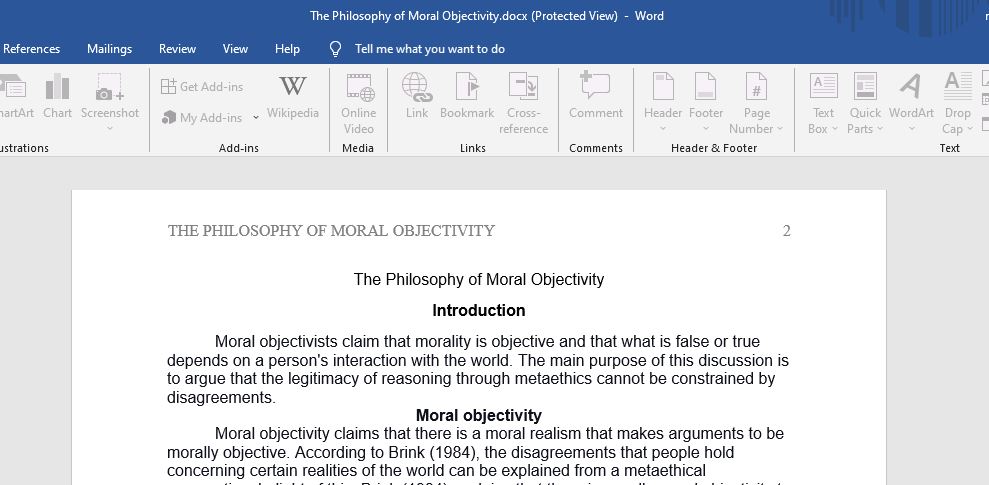Discussion Topic: Philosophy of moral objectivity
Assignment Description
Choose one of the following topics and write a single-spaced essay of at least 2000 words. Your introduction and conclusion, if any, should be no more than two sentences each. I discourage you from doing any research beyond extremely careful reading of the assigned texts. The goals of the exercise are 1) to demonstrate a precise understanding of the texts we have studied, and 2) to develop your ability to defend philosophical positions with arguments of your own. You should make extensive use of the texts by citing specific pages and, where appropriate, quoting. Give citations whenever you refer to someone else’s idea. Use any accepted citation format, but use it consistently. If you have any questions, please contact me via email or visit my virtual office hours.
BEWARE: YOU MUST RAISE AND RESPOND TO OBJECTIONS TO YOUR OWN POSITION OR YOUR GRADE WILL SUFFER SEVERELY. LATE PAPERS WILL BE PENALIZED.
1. Recount what you consider to be the strongest arguments against moral objectivity. Present the best objections to each argument and respond to them. Keep up the debate for as long as you can. Draw upon the assigned readings by J. L. Mackie, Gilbert Harman, David O. Brink, Russ Shafer-Landau, and Mary Midgley. Be sure to go beyond these readings, raising your own arguments to support your position on moral objectivity.
2. In the nation of Genovia, ninety-nine percent of the population worships the moon as a god. One percent does not. Genovians occasionally vandalize the homes of these non believers. This has been common practice in Genovia for as long as anyone can remember. Ninety-nine percent of Genovians participate in the vandalism. Genovia has no history of religious toleration. The nation of Kenovia, by contrast, has a long history of religious toleration. Ninety-nine percent of Kenovians believe that it is immoral to vandalize someone’s home because of his or her religious beliefs. They believe that intolerant vandals deserve to have their index fingers broken. One day a Kenovian woman visits Genovia and sees a Genovian vandalizing a house. She learns that it is a nonbeliever’s house and that the Genovian police will not intervene. She explains to the vandal her opinion that his behavior is immoral. She asks him to stop, but he ignores her, so she physically restrains him and threatens to break his index fingers if he continues. Take a position on the moral permissibility of the actions taken by both the Genovian vandal and the Kenovian visitor. Explain your judgment with reference to various metaethical positions and arguments for those positions. Draw extensively upon the assigned readings. Defend your position against anticipated criticisms. Although you must, at a minimum, address the hypothetical case described, I encourage you to deepen your discussion by considering various modifications of the case (e.g., what if the vandal did something worse than vandalism to nonbelievers? What if the nonbeliever had his own religion that involved burning dogs alive?).
3. Charlie is a four-year-old chimpanzee. He communicates using American Sign Language, solves simple puzzles, recognizes familiar people, and obeys various instructions. Herb is a fifteen-year-old human being (homo sapiens) with a severe mental impairment. He will never be able to use or understand human language. He will never be able to recognize people, solve even simple puzzles, or obey instructions. Engaging Peter Singer’s arguments, defend a position regarding the morally permissible treatment of Charlie and Herb. For example, is it permissible for medical researchers to perform painful experiments on Charlie for the purpose of saving human lives? Is it permissible to perform painful experiments on Herb for that purpose? Is it permissible to kill Charlie and consume his flesh for its taste (when doing so isn’t necessary for one’s own health)? Is it permissible to kill Herb for that reason? Defend your position against objections.
Formatting: Compose in 12pt, Arial, single spaced and submit in DOCX, DOC, RTF, or PDF.
TEXTBOOK
(FE) Fundamentals of Ethics
Ch. 21
(EL) The Ethical Life
Ch. 14 Hume
Ch. 15 Mackie
Ch. 16 Harman
Other Assigned Readings
David O. Brink, “The Argument from Queerness”
Mary Midgley, “Trying Out One’s New Sword”
Peter Singer, “Unsanctifying Human Life”
ATTACHMENTS
Kind Regards
Caution: please focus on quality Grammar/ English, correct spellings and also ensure u attend to all questions carefully and according to the set forth instruction. Ensure u re-read your work to eliminate any mistake also note Overdue answers will not be tolerated ** Good luck**
Note the following.
-Proof reading is compulsory.
-Work must be passed through grammarly.
-Work must be free of plagiarism.
-You are liable for your own revision otherwise you will not be paid.
Answer preview:

word limit:2153
